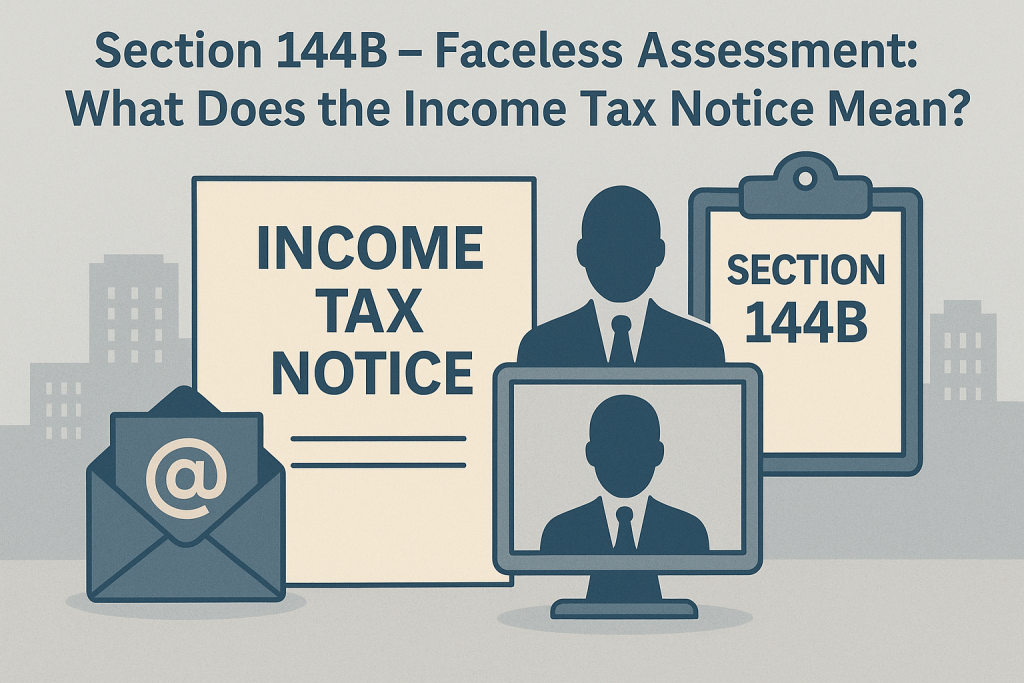Section 144B - Faceless Assessment: What Does the Income Tax Notice Mean?
Have you received a notice from the Income Tax Department stating that your Income Tax Return (ITR) for Assessment Year 2024–25 has been selected for faceless scrutiny under Section 144B?
Don’t panic. This is a routine process in many cases and does not necessarily imply any wrongdoing on your part. In this blog, we’ll help you understand what the notice means, why you may have received it, and what steps you should take next.
📄 Why Did You Receive This Notice?
The notice simply informs you that your return has been picked for faceless assessment under Section 144B of the Income Tax Act.
This does not automatically mean that there is an issue with your return. The selection can be a part of the department’s regular review mechanism.
❓Will You Receive Further Notices?
Yes, most likely.
The current communication is just an intimation. A detailed notice may follow, which could ask for:
- Clarifications
- Additional documents
- Explanations regarding certain entries or claims
You can find all such notices under the “e-Proceedings” section of the Income Tax Portal.
🔍 Common Reasons for Selection Under Section 144B
Your ITR may have been flagged for any of the following reasons:
💰 1. High Refund Claimed
If you’ve claimed a large refund not backed by corresponding TDS or advance tax, it can trigger scrutiny.
🏛 2. Political Donations (Section 80GGC)
Returns with high donations to political parties may be selected, particularly when:
- Amounts are unusually high
- Donations are made in cash (which is disallowed)
- No digital payment trail or bank record exists
📊 3. Mismatch in Reported Income
Discrepancies between your ITR and data from:
- Form 26AS
- Annual Information Statement (AIS)
- Taxpayer Information Summary (TIS)
Common mismatches include:
- Salary income
- Interest income
- TDS credits
🏘 4. High-Value Transactions
Certain transactions often catch attention:
- Property purchases
- Stock market trading
- Large mutual fund investments
- Foreign remittances or overseas assets
🧾 5. Unusual Deductions or Loss Claims
Significant claims under:
- Section 80C (e.g., PPF, ELSS)
- Section 80D (Health Insurance)
- Business or Capital Losses
Such claims may invite scrutiny if they seem inconsistent with your income level.
🎲 6. Random Selection
At times, cases are picked randomly to ensure compliance. This does not reflect any specific issue.
📁 What Documents Might Be Requested?
If your return is under scrutiny, you may be asked to furnish:
- 🏦 Bank Statements – To verify income and refund claims
- 📑 Proof of Deductions – LIC, mediclaim, tuition, loan interest, donations, etc.
- 📉 Investment/Capital Gains Details – Especially for real estate, stocks, or business losses
- ❗ Clarification on Mismatches – Between ITR and Form 26AS/AIS/TIS
Particulars | Section 143(2) | Section 144B |
Title | Notice for Scrutiny Assessment | Faceless Assessment |
Purpose | To initiate scrutiny to verify return accuracy | Framework for faceless assessment under Sec 143(3)/144 |
Nature | Procedural notice by AO | Full mechanism for faceless assessment |
Trigger Point | AO believes return needs deeper verification | Assessment conducted in faceless mode |
Time Limit | Within 3 months from FY-end in which return filed | No specific limit – post notice u/s 143(2) or 148 |
Mode of Assessment | Manual, traditional or faceless | Fully faceless and electronic |
Authority Involved | Jurisdictional AO | NaFAC, Assessment Units, Review Units |
Communication | May include personal hearing | Fully electronic – no face-to-face |
Applicable For | All scrutiny assessments (manual/faceless) | Only faceless assessments (except excluded under 144B(8)) |
Legal Outcome | Assessment under Section 143(3) | Assessment under Section 143(3) or 144 |
Amendment | Provision in place since 1961 | Inserted by Finance Act 2020 (effective 1st April 2021) |
📌 What You Should Do Now
Follow these steps to stay compliant:
- Log in to https://www.incometax.gov.in
- Go to the “Pending Actions” or “e-Proceedings” section
- Check regularly (at least once every few days)
- Respond promptly to any notice — response time is generally 7 to 15 days
- If needed, consult ChhotaCFO for guidance
Failure to respond may result in penalties or adverse assessments without your inputs.
🛡 Final Word
Faceless assessments are part of the Income Tax Department’s initiative to enhance efficiency, transparency, and accountability.
If your filings are correct and you have supporting documents for your claims, there is no need to worry. Stay proactive, keep your records ready, and respond promptly to communications from the department.




